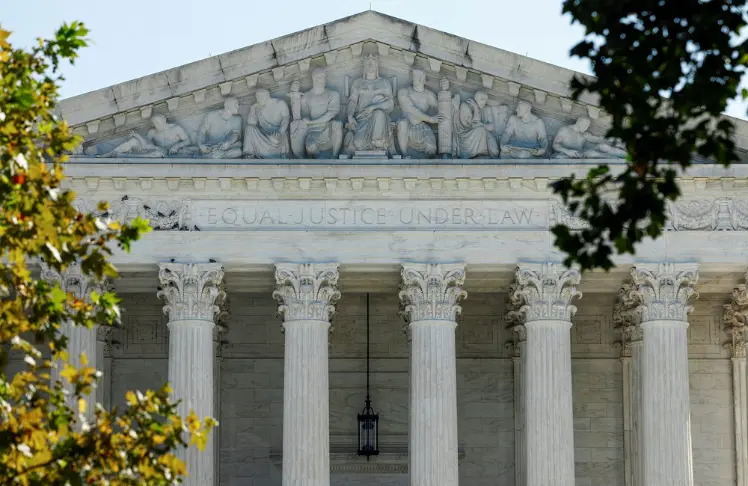
By Brian Fung, CNN
Washington (CNN) — The US Supreme Court is hearing oral arguments Monday in two cases that could dramatically reshape social media, weighing whether states such as Texas and Florida should have the power to control what posts platforms can remove from their services.
The high-stakes battle gives the nation’s highest court an enormous say in how millions of Americans get their news and information, as well as whether sites such as Facebook, Instagram, YouTube and TikTok should be able to make their own decisions about how to moderate spam, hate speech and election misinformation.
At issue are laws passed by the two states that prohibit online platforms from removing or demoting user content that expresses viewpoints — legislation both states say is necessary to prevent censorship of conservative users.
More than a dozen Republican attorneys general have argued to the court that social media should be treated like traditional utilities such as the landline telephone network. The tech industry, meanwhile, argues that social media companies have First Amendment rights to make editorial decisions about what to show. That makes them more akin to newspapers or cable companies, opponents of the states say.
The case could lead to a significant rethinking of First Amendment principles, according to legal experts. A ruling in favor of the states could weaken or reverse decades of precedent against “compelled speech,” which protects private individuals from government speech mandates, and have far-reaching consequences beyond social media.
A defeat for social media companies seems unlikely, but it would instantly transform their business models, according to Blair Levin, an industry analyst at the market research firm New Street Research.
“This case represents the single biggest near-term risk to the social media platforms’ business models,” Levin wrote in a research note Monday, adding that the case has the potential “to make a sudden and dramatic turn that would materially disrupt” their ability to moderate content and, in turn, their attractiveness to advertisers.
Questions on Florida law
Supreme Court justices opened Monday’s oral arguments by questioning Florida Solicitor General Henry Whitaker about the broad scope of the state’s law restricting content moderation.
Justice Sonia Sotomayor said Florida’s law could prevent the online marketplace Etsy from curating items sold by its users.
“This is so, so broad, it’s covering almost everything” on the internet, Sotomayor said. “But the one thing I know about the internet is that its variety is infinite.”
Etsy necessarily has to be able to curate what it shows users or else they would be overwhelmed by the variety, Sotomayor said.
Whitaker said Florida’s law is limited by its definition of social media companies, which focuses on large platforms.
In addition to Etsy, other justices pushed Whitaker to play out how sites including Facebook and LinkedIn could be affected by the Florida law’s breadth.
“What do you do with [the scenario of], LinkedIn has a virtual job fair, and it has some rules about who can be involved?” Justice Ketanji Brown Jackson asked. She also pushed Whitaker to say how Florida’s law might affect Facebook’s news feed differently from other parts of its platform.
Whitaker took the broad position that Florida’s law wants to treat platforms as “common carriers,” a regulatory designation that has applied to telecom companies and railroads. That would mean, he said, that the justices would not need to address many of the hypotheticals being raised by the court, because that designation would preempt a debate about the First Amendment.
Impact on other tech companies
Justice Amy Coney Barrett sounded a skeptical note on Florida’s law, echoing her colleagues on its breadth.
“Florida’s law, so far as I can understand it, is very broad,” Barrett said, ticking off still other companies that could be affected. “We’re talking about the classic social media platforms, but it looks to me like it could cover Uber. It looks to me like it could cover Google’s search engine, Amazon Web Services. And all of those things would look very different.”
Earlier, Barrett and fellow conservative Justice Brett Kavanaugh zeroed in on a key issue in the case: Whether the First Amendment prevents states from forcing private businesses to host others’ speech.
Kavanaugh told Whitaker Florida’s argument had “left out” that the First Amendment restricts governments, not businesses.
Barrett asked Whitaker to explain how social media platforms were not like newspapers or bookstores.
“Could Florida enact a law telling bookstores that they have to put everything out by alphabetical order, and that they can’t organize or put some things closer to the front of the store that they think you know, their customers will want to buy?” Barrett asked.
Whitaker said social media platforms had opaque algorithms that prevent users from fully understanding how content curation happens.
This is a developing story. It will be updated.
The-CNN-Wire
™ & © 2024 Cable News Network, Inc., a Warner Bros. Discovery Company. All rights reserved.















